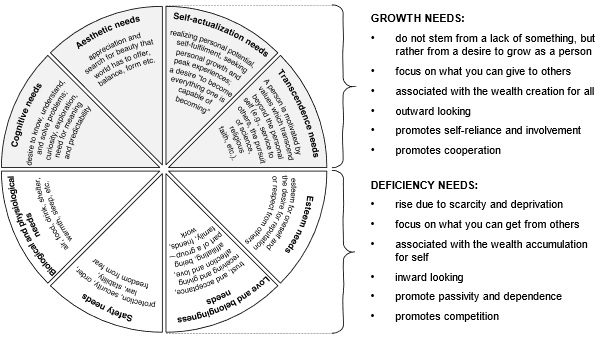
Published in Malay Mail & Malaysiakini, image by Malay Mail.
Behavioural sciences have long informed us that human need is one of the greatest inner motivators of our behaviour. However, what type of individual needs leads to what kind of behaviour? Also, how does it all adds up on the national level? Given the recent pervasive lapse of moral-ethical integrity and wide-spread corruption, it probably makes sense to revisit these questions.
The initial scientific findings suggested that we are all driven by a group of universal needs prioritised by individuals in a hierarchical order (Maslow’s hierarchy of needs). The hierarchy starts with the basic needs such as biological and physiological and ends with the highest order needs such as self-actualisation or transcendence.
The existence of these universal categories of human needs has been firmly re-established in contemporary empirical studies. The researchers strongly confirmed the universality of human needs regardless of the cultural differences but found no evidence of any universal hierarchy. In other words, human beings appear to pursue all these needs at the same time.
From these theoretical insights, it appears logical then to portray the universal human needs in the form of a sliced pie (refer to the graph below) rather than a hierarchical pyramid as in Maslow’s original representation.
Now, this pie visualisation of our needs is critical to understanding why “when needs are simple, life will not be suffocating”.

Each of us has our own needs pie, and the size of this pie can be viewed as being relatively fixed by our life energy potential. However, it is within our control to decide how we slice our needs pie — which needs we choose to prioritise more and pursue the most!
Before we slice, though, let’s notice that all those needs can be broadly categories as either deficiency or growth needs. The same visualisation above helps us to see how contrasting these two groups of needs are.
The deficiency needs arise due to scarcity of resources, are fuelled by our self-interest and focus on the accumulation of material possessions, often in a competitive manner. On the contrary, the growth needs do not stem from scarcity but create abundance. These needs have an ultimate outward focus on wealth creation for the selves and, importantly, for others done in the spirit of cooperation and respect for the dual value of life (our own life and lives of others).
Self-interest and pursuit of own deficiency needs are not wrong; rather, these qualities are innate to human nature. What is wrong is self-interest at the expense of others which is very intimately related to the extravagance of needs, opulence, and excessive lifestyle outside, or even within, one’s means.
Let’s look at the above graph closely again. We can see that the pursuit of individual growth needs, because of its outward focus, plays the role of an important connecting tissue of society that integrates humanity at the national and trans-national scale.
On aggregate, a society where every individual is preoccupied with their deficiency needs very often crosses that line — ”self-interest not at the expense of others”. Remember, the size of our individual needs pie is fixed! Therefore, slicing a larger chunk for our material, inward-looking and competitive acquisitive needs, each of us is left with less energy potential to pursue our growth needs that transcend the personal self. As a result, we have a society easily divisible along our differences and deeply eroded by greed, abuse of any easy money opportunity, hardcore corruption and other social evils.
On the contrary, when on aggregate more individuals voluntarily decide to pursue simplicity of the material needs, we have a society where mutual trust, respect and appreciation of differences rather than notorious tolerance are not meaningless words; where there is strict observance of good governance and common laws; where everyone is given an equal opportunity to participate in (and consciously taking active part) in the process of value creation; where via cooperation the solutions are born that cater to many leaving no one behind including our natural habitat; and where many other shared prosperities and high objectives are realised.
And then, a voluntary choice to pursue the simplicity of own deficiency needs does not contradict self-interest.
It turns out that behavioural scientists have studied the voluntary need simplifiers profusely over the past four decades in various ways, both qualitative and quantitative. Among the well-being outcomes reported to be positively strongly associated with the simplicity of material needs are the following: increased life satisfaction and happiness; lower levels of anxiety, insecurity, depression and mental distress; increased sense of independence; reduced clutter in life; a greater sense of control over life and daily activities; financial freedom (elimination of debt and financial success); increased mindfulness; more meaningful and fulfilling relationship with others.
Sometimes we do not need scientists to tell us. We can note certain correlations and conduct life experiments on our own.
In the medical field, skipping a meal and having a simpler, less extravagant food is continuously associated with a longer, healthier life span. It is way cheaper too! Make an experiment yourself compare the price of a cart loaded with simple vegetables, grains and even meat versus a cart loaded with the processed and carbs-rich food — eating “junk food” turns out to be another extravagance.
Professional fashion stylists associate elegance, class, and style with the “capsule wardrobe” instead of a cluttered wardrobe composed even of the most trendy items. In the capsule wardrobe, a very minimum number of cloth items carefully selected, usually timeless, complement each and produce an astonishing variety of combinations.
With your wardrobe, you can conduct another eye-opening experiment. Place all the hangers in your closet facing in one direction, and every time you wear cloth, put it back into the wardrobe with its hanger facing the opposite direction. After running, this experiment for few months, analyse how many hangers are facing in which direction! Beware, the result may suffocate you.
Having bigger apartments or houses overloaded with fancy features also lead to higher utility bills. Owning flashy cars is associated with higher maintenance costs. Going to the gym is trendy but expensive, unlike going to the free gym (a nearby park), which is also associated with a higher chance to remain consistent. And the list can go on.
“When needs are simple, life will not be suffocating” encapsulates the above empirical findings and practical observations very well.
“When needs are simple, life will not be suffocating” — a simple yet catchy phrase, easy to remember, with profound meaning and far-reaching implications. Perhaps, as a nation, we should keep repeating it to each other, our friends, colleagues, family members, but before anyone else to ourselves. Because as human beings, we all are not perfect, we need to be reminded and, sometimes, reminded and reminded again.
Those needs simplifiers who are already staying the course should motivate, encourage and support others. While doing so, let us do not be condescending and sarcastic. Even the slightest needs simplification by each of us can have a profound “butterfly wing effect” for the nation.
Let us be realistic. Living a simple, near ascetic life is out of reach for an ordinary human being. However, each of us can make even a few small steps towards liberating ourselves from the burden of having so much stuff and clutter in our life. Having so much stuff creates a visible and invisible barrier from behind which we cannot see others but also the truer selves — this is the actual suffocation.
“When needs are simple, life will not be suffocating!” we can take this motto not as a final destination but rather as a friendly invitation to a transformational journey towards internalising and eventually manifesting simple yet fulfilling and not suffocating life for ourselves and the entire nation.

